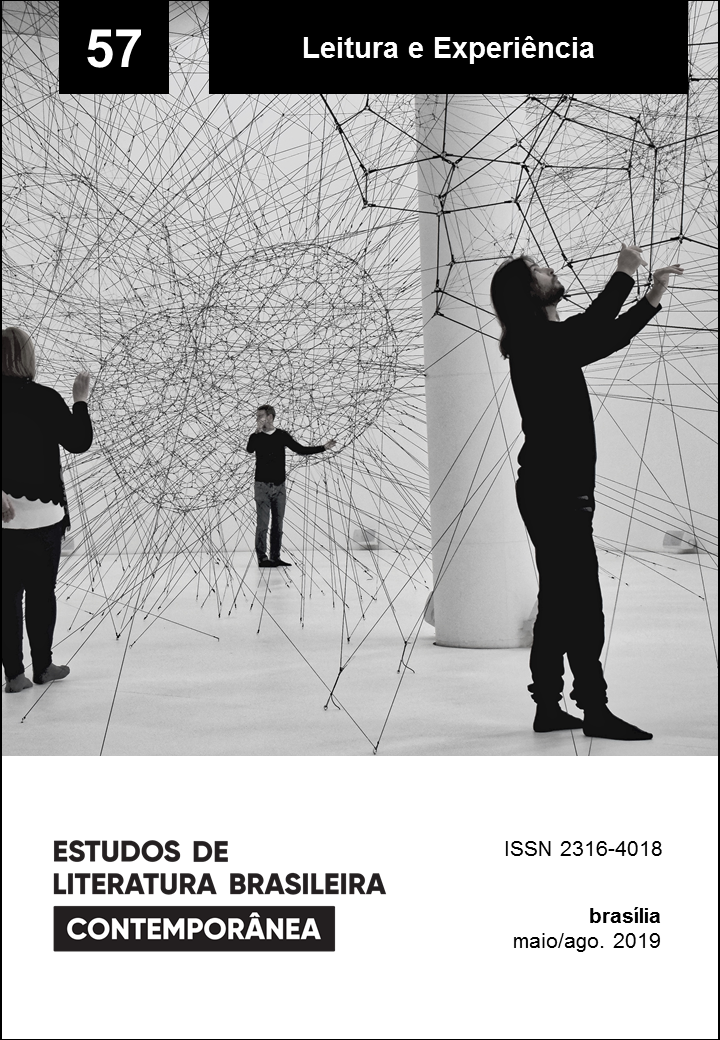Writing, experience, and literary experience in Montaigne’s Essays and Sartre’s Nausea
DOI:
https://doi.org/10.1590/2316-4018572Keywords:
writing, experience, Montaigne, SartreAbstract
This article begins with an analysis of the semantic, tropological, and metaphysical associations of our modern concept of “experience,” which distinguish its form and contents from other opposing concepts. These not only include such general notions as Reason, Education, and Science, they also point to how “experience” has been thought, and lived, in opposition to the verbal and representational media of texts, printed books, and writing in general. Deconstruction (Derrida) and media theory (McLuhan) provide us with ways of understanding how the emergence of our concept of “experience” relied on, as much as it opposed, the media of writing and books, and their surrounding practices and institutions (like reading and schooling). “Experience” per se is perhaps unthinkable without such media and their institutionalized practices. More than modern theory, however, it is one of the major functions of modern literature to display this relation of conflict and dependence, and, even, to embody it in its very form in literary writing. Beyond the opposition of writing and “experience” is thus posed the question of the nature of the equivocal concept of “literary experience.” What would such a thing entail? This article explores this concept through two texts that attempt to bring “experience” into their very form: Montaigne’s Essays and Sartre’s Nausea.
Downloads
References
ADORNO, Theodor W. (2001). The culture industry: selected essays in mass culture. London: Routledge.
ALTHUSSER, Louis (1995). Idéologie et appareils idéologiques d’Etat. In: ALTHUSSER, Louis. Sur la reproduction. Paris: Presses Universitaires de France. p. 269-314.
BENJAMIN, Walter (1999). Experience and poverty. In: BENJAMIN, Walter. Selected writings. Cambridge, MA: Harvard; Belknap Press. v. 3. p. 731-736.
DERRIDA, Jacques (1967). De la grammatologie. Paris: Minuit.
DESCARTES, René (1637). Discours de la méthode. Leiden: Jan Maire.
FARBER, Leslie (1976). Lying, despair, jealousy, envy, sex, suicide, drugs, and the good life. New York: Basic Books.
JEANNERET, Michel (1997). Perpetuum mobile. Métamorphoses des corps et des oeuvres de Vinci à Montaigne. Paris: Macula.
MCLUHAN, Marshall (2011). The Gutenberg Galaxy: the making of typographic man. Toronto: University of Toronto Press.
MONTAIGNE, Michel de (2014). Les essais. Paris: Presses Universitaires de France.
NIETZSCHE, Friedrich (2000). The birth of tragedy. New York: Oxford University Press.
RANCIÈRE, Jacques (2008). Why Emma Bovary had to be killed. Critical Inquiry, v. 34, n. 2, p. 233-248.
SARTRE, Jean-Paul (1938). La nausée. Paris: Gallimard.
SARTRE, Jean-Paul (1976). L’être et le néant. Paris: Gallimard.
SARTRE, Jean-Paul (1986). l’imaginaire. Paris: Gallimard.
Published
How to Cite
Issue
Section
License
Authors who publish in this journal agree to the following terms:
a) The authors maintain the copyright and grant the journal the right of first publication, the work being simultaneously licensed under the Creative Commons Attribution License-Non Commercial 4.0 which allows the sharing of the work with acknowledgment of the authorship of the work and publication this journal.
b) Authors are authorized to enter into additional contracts separately, for non-exclusive distribution of the version of the work published in this journal (eg publish in institutional repository or as a book chapter), with authorship recognition and publication in this journal.
c) Authors are allowed and encouraged to publish and distribute their work online (eg in institutional repositories or on their personal page) after the editorial process, as this can generate productive changes, as well as increase the impact and citation of published work (See The Effect of Free Access).
d) The authors of the approved works authorize the magazine to, after publication, transfer its content for reproduction in content crawlers, virtual libraries and the like.
e) The authors assume that the texts submitted to the publication are of their original creation, being fully responsible for their content in the event of possible opposition by third parties.


